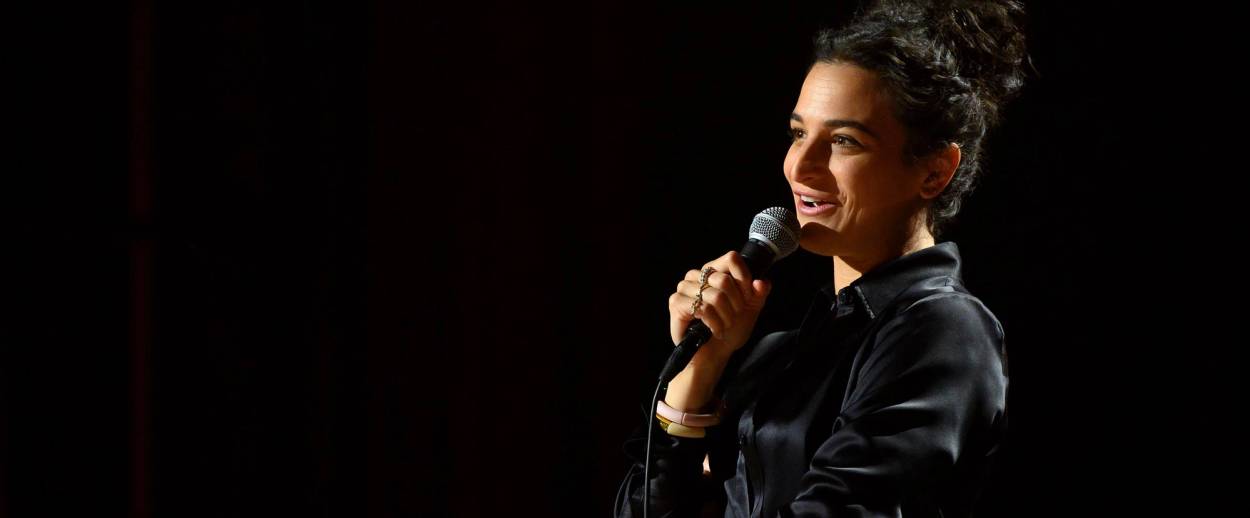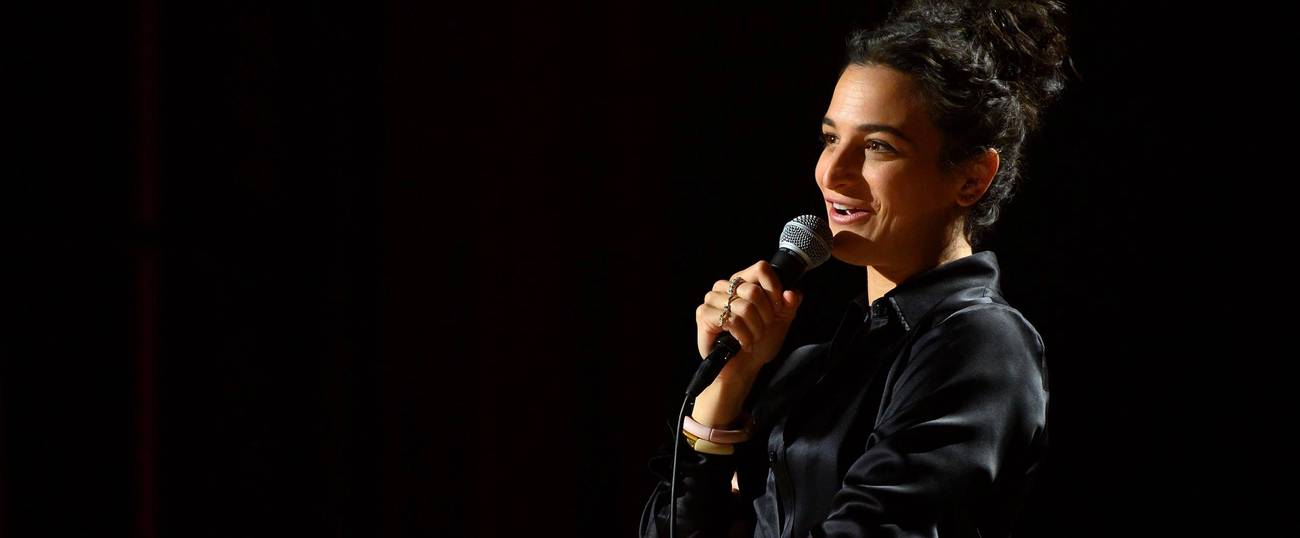Jenny Slate’s Intimate Stand-up
A new comedy special speaks directly to Jewish women




Jenny Slate’s new stand-up special on Netflix feels as intimate as a hushed conversation between best girlfriends on the top bunk of a bunk bed after lights out at Jewish sleep-away camp. I realize that this, as an image, is very specific. So is the special.
It feels strange that anyone with a Netflix account (or their friend’s or sister-in-law’s password) can experience Slate’s special, Stage Fright, because it feels so specifically Jewish, female, anxious, and overeducated. Some of these words may be synonyms, I am aware. I wondered, watching: How could a non-Jew—or man—fully appreciate this program? Could they even enjoy it?
Stage Fright is a mix of stand-up, old family movies, and interviews with Jenny’s parents and sisters in Slate’s childhood home in Milton, Massachusetts. The show has several false starts, like life itself, and for the first few minutes, Slate giggles so maniacally I worried for her: Is she OK?
References to her Jewishness come fast and furious: She tells the audience, “My name is Jenny Slate, and if you’re looking at me from any angle, you will notice that I am a Jewish woman.” She says, “I know you’re wondering: What weird, late-in-life bat mitzvah did I stumble into?” And she informs us, “When I was younger, I looked exactly like Anne Frank … and I was incredibly stuck up about it.” She follows up with a series of wildly physical wordless jokes: Slate staring—haunted and huge-eyed—into the camera, then showing off her Big Frank Energy by hurling herself around, taking over the space, growling, “I’m still here!”
Soon, you realize that you just have to settle into Slate’s own odd and neurotic rhythms, and you realize that hoping she’s OK is part of the experience of watching her.
She introduces us to her two grandmothers: Her grandmother Rochelle is “like a Turkish, Cuban, French lady” and “all she eats is stinky little fish and mustard.” Her Grandma Connie speaks in a croak, “like diamonds being rolled around in the dust.” The show then cuts to each of them speaking, and we laugh at how perfect, and perfectly affectionate, Slate’s impressions of them are. She does Grandma Connie telling her, gravelly and Boston-accented and intense, “I love you … you’re not only beautiful … but you’re kind.” And it’s not a joke. It’s a moment of pure intergenerational love. The stand-up audience sounds like it doesn’t quite know how to respond, but I found tears springing to my eyes. My grandparents were from Boston, too; Grandma Connie sounds like my family. When Slate describes her grandmother’s closet: “It smells like powder and the perfume that is called Shalimar,” I rocketed back to my own Bubbe Olla’s bedroom in Sharon, Massachusetts, with a bottle of Shalimar and a wig form on the vanity. Olla died when I was 14, but sense memories are powerful things.
The most traditionally stand-uppy moment comes early on, a schticky bit about Christians versus Jews. It is saved from full borscht-beltness by the fact that Slate alternates telling jokes about Judaism with trying to dislodge an ill-timed wedgie: Imagine the weirdness of a beautiful—and very Jewish looking, she doesn’t lie—woman, dressed totally glam in a silky black Nili Lotan pantsuit, picking at her butt and informing us that she’s yanking fabric out of her vagina—it is jarring. I am certain not every viewer would be charmed. I was.
She observes about Christians, “They’re in the best mood! Their God got killed as a hunk and they’re not even upset!” Channeling Jesus, she coos, “Don’t worry about it; I don’t wanna stress you out. My body’s a cracker, nom nom nom, drink my blood, it’s wine, this is a party.” Back in her Jewish body, she says sadly, “I felt so shortchanged. Santa comes down the chimney, he never catches on fire, ‘everything fine, we never worry, it’s not in our culture.’” Contrast that with … (she begins singing a New York-accented minor-key dirge): “They tried to kill us in the past … they’re gonna do it again … take a rest just for a moment … there’s only one drop of oil for a million people.” We cut to a home video of little Jenny and her family lighting Hanukkah candles, singing the blessings in perfect Hebrew.
She jokes about being constantly mistaken for one of the actresses in Broad City: “Yeah, I’m those women! I’m either one! I’m both! It doesn’t matter!” (This had added Jewish-guilt impact for me because my daughter Maxine walked by as I settled down to watch the show, peered at the screen, and said, “Oh, she’s on Broad City.”) Slate delves into not understanding her own lack of middle school popularity (“I was popular at camp!”—a familiar Jewish-girl refrain) and eating lunch alone in the middle school bathroom. She spins, in an ethereal dream, in Grandma Connie’s closet, wearing an old pink chiffon gown; Grandma Connie wants to give it to her. She and her sisters tell legitimately terrifying ghost stories about the haunted house they grew up in, which their parents are now trying to sell. In an offstage interview, Slate stammers while talking about her stage fright: “I’m presented with the essential question: Will they, will they like me? I know they will once I start to talk, but I don’t earn the love unless I give something beautiful, that goes out. So my stage fright comes from a deeper thing of, like, exchange.”
Suddenly, we’re in deeply serious territory, pondering self-worth, loneliness, fears of abandonment. There are ghost stories, and there are the fears that underlie ghost stories.
*
I’m older than Slate, who’s 37, but younger than her parents, and I felt simultaneously maternal and sisterly toward her … and protective from both perspectives. She seems like someone who’s had a lot of therapy, in the best way. I felt bad for my prurient interest in her (now kaput) romance with Chris Evans.
Slate grew up in a Conservative Jewish home, with a biologist mom and businessman/poet dad. One sister became a nurse; the other a mental-health counselor. Slate, the middle daughter, went to Columbia. She acts and writes; she and her dad created an art book together about their haunted home; About the House was published in a very limited run and given away free with proof of donation to any charity.
Slate clearly obsesses about her perceived romantic failures, what they say about her, and how other people see her. (The specter of Captain America hangs over the special, clearly not just for me.) She and her first husband, Dean Fleischer-Camp, were married for four years; together they created the strange, childlike YouTube show (and follow-up book) Marcel the Shell with Shoes On. On YouTube, Marcel is a live action/animation hybrid show about, well, a shell, with one googly eye and a pair of shoes. When the first episode came out in 2010, I watched it with little Maxine, then 6, on my lap. She was transfixed. She didn’t understand it, but she wanted to watch it over and over. Slate’s work is seductive that way. She narrates Marcel being interviewed by an off-screen Fleischer-Camp, as if in a documentary, in a scratchy, soft, little-kid voice—you have to lean in. And you feel melancholy even as you laugh. “My one regret is I will never have a dog,” Marcel says. “But sometimes I tie a piece of lint to a string and I drag it around. You know what they say … a lint is a shell’s best friend.” In the final episode, Marcel sings a lovely, forlorn little song about a perfect day while looking out an open window by a garden, as rain splashes onto the sill. As the last notes die away, Marcel says, “I learned it at camp and I sing it because my best friend lives far away.”
Slate can also be heard as Missy Foreman-Greenwald on the new season of Big Mouth on Netflix, and her new book, Little Weirds, came out last week. The latter is another oddity. Garnering mixed reviews, it’s a mix of microfiction, poetry, and autobiographical musings. It’s consciously literary, with everything that adjective entails. The cover design and font recall Flannery O’Connor’s The Complete Stories, but instead of a peacock tail encircling the title, there’s a floral wreath dotted with a dinosaur, a shell, a hot dog, a camera, a row of Fudgsicles. This work, too, feels somehow lonely. “You protect yourself and all the little weirds that make up who you are,” Slate writes. She also writes, “I am actually a homemade Parisian croissant. Pair me with jam. Treasure me for my layers and layers of fragility and richness.”
***
Like this article? Sign up for our Daily Digest to get Tablet magazine’s new content in your inbox each morning.
Marjorie Ingall is a former columnist for Tablet, the author of Mamaleh Knows Best, and a frequent contributor to the New York Times Book Review.